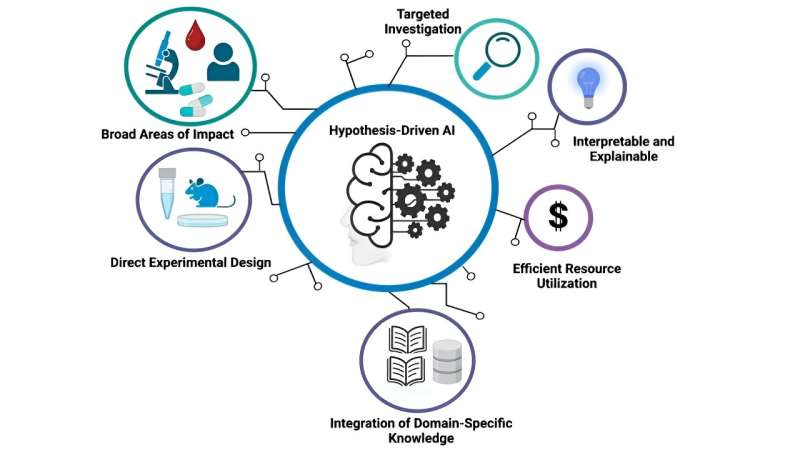This article has been reviewed according to Science X's editorial process and policies. Editors have highlighted the following attributes while ensuring the content's credibility:
fact-checked
trusted source
proofread
Researchers invent a new class of AI to improve cancer research and treatments

Mayo Clinic researchers recently invented a new class of artificial intelligence (AI) algorithms called hypothesis-driven AI that are a significant departure from traditional AI models which learn solely from data.
In a review published in Cancers, the researchers note that this emerging class of AI offers an innovative way to use massive datasets to help discover the complex causes of diseases such as cancer and improve treatment strategies.
"This fosters a new era in designing targeted and informed AI algorithms to solve scientific questions, better understand diseases, and guide individualized medicine," says senior author and co-inventor Hu Li, Ph.D., a Mayo Clinic Systems biology and AI researcher in the Department of Molecular Pharmacology and Experimental Therapeutics. "It has the potential to uncover insights missed by conventional AI."
Conventional AI is primarily used in classification and recognition tasks, such as face recognition and imaging classification in clinical diagnosis, and it has been increasingly applied to generative tasks, such as creating human-like text. Researchers note that conventional learning algorithms often do not incorporate existing scientific knowledge or hypotheses. Instead, these rely heavily on large, unbiased datasets, which can be challenging to obtain.
According to Dr. Li, this limitation considerably restricts the flexibility of AI methods and their uses in areas that demand knowledge discovery, like medicine.
AI is a valuable tool for identifying patterns in large and complex datasets like those employed in cancer research. The central challenge in using conventional AI has been maximizing the embedded information within those datasets.
"Lack of integration between existing knowledge and hypothesis can be a problem. AI models may produce results without careful design from researchers and clinicians what we refer to as the 'rubbish in rubbish out' problem," says Dr. Li.
"Without being guided by scientific questions, AI may provide less efficient analyses and struggle to yield significant insights that can help form testable hypotheses and move medicine forward."
With hypothesis-driven AI, researchers look to find ways to incorporate an understanding of a disease, for example, integrating known pathogenic genetic variants and interactions between certain genes in cancer into the design of the learning algorithm. This will enable researchers and clinicians to determine which components contribute to model performance and, hence, enhance interpretability. Further, this strategy can address dataset issues and promote our focus on open scientific questions.
"This new class of AI opens a new avenue for better understanding the interactions between cancer and the immune system and holds great promise not only to test medical hypotheses but also predict and explain how patients will respond to immunotherapies," says Daniel Billadeau, Ph.D., a professor in Mayo Clinic's Department of Immunology. Billadeau is a co-author and co-inventor of the study and has a long-standing research interest in cancer immunology.
The research team says hypothesis-driven AI can be used in all sorts of cancer research applications, including tumor classification, patient stratification, cancer gene discovery, drug response prediction and tumor spatial organization.
Benefits of hypothesis-driven AI:
- Targeted: Focuses on specific hypotheses or research questions.
- Leverages existing knowledge: Guides exploration to find previously missed connections.
- More interpretable: Results are easier to understand than with conventional AI.
- Reduced resource needs: Requires less data and computing power.
- "Machine-based reasoning": Helps scientists test and validate hypotheses by incorporating hypotheses and biological and medical knowledge into the design of the learning algorithm.
Dr. Li notes that the disadvantage of this tool is that creating these types of algorithms requires expertise and specialized knowledge, potentially limiting wide accessibility. There is also potential for building in bias, and they say researchers must watch for that when applying different pieces of information. In addition, researchers generally have a limited scope and won't be formulating all possible scenarios, potentially missing some unforeseen and critical relationships.
"Nonetheless, hypothesis-driven AI facilitates active interactions between human experts and AI, that relieve the worries that AI will eventually eliminate some professional jobs," says Dr. Li.
Since hypothesis-driven AI is still in its infancy, questions remain, such as how to best integrate knowledge and biological information to minimize bias and improve interpretation. Dr. Li says despite the challenges, hypothesis-driven AI is a step forward.
"It can significantly advance medical research by leading to deeper understanding and improved treatment strategies, potentially charting a new roadmap to improve treatment regimens for patients," says Dr. Li.
More information: Zilin Xianyu et al, The Rise of Hypothesis-Driven Artificial Intelligence in Oncology, Cancers (2024). DOI: 10.3390/cancers16040822




















